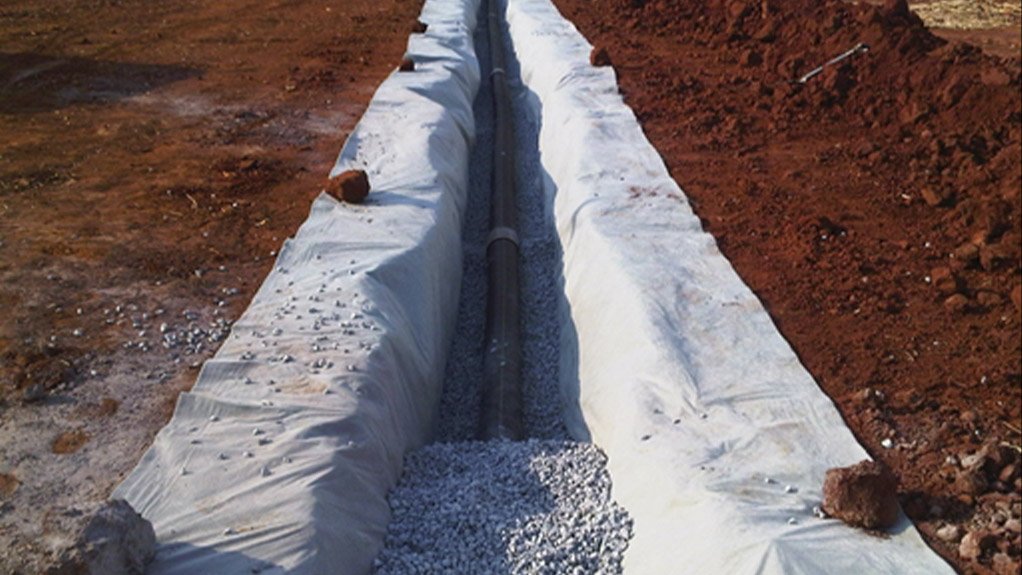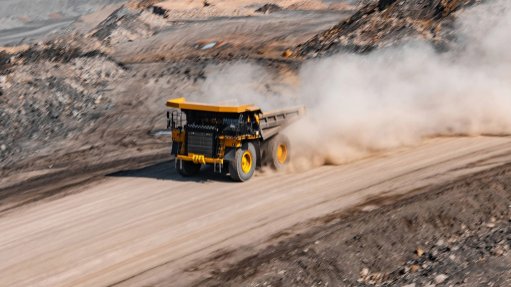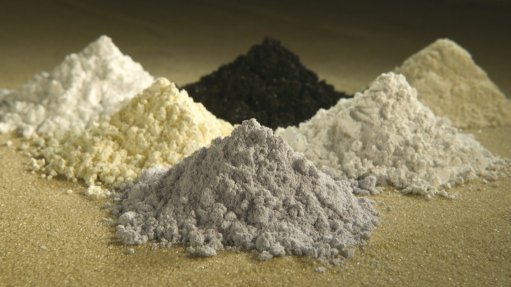Kaytech remains only African producer of bidim
From the Durban Harbour quay wall, in KwaZulu-Natal, to the Glen Shopping Centre, in Gauteng, Durban-headquartered geosynthetics manufacturer and supplier Kaytech’s all-purpose geotextile bidim, is the first geotextile used in South Africa.
Introduced by Kaytech in 1971, bidim was the first nonwoven geotextile ever made and the company remains the only manufacturer of the continuous filament, spunbond, needle-punched nonwoven geotextile in Africa.
Bidm was developed by French company Rhone Poulenc in 1968 initially as a separation layer between selected material and insitu soil in road construction, says Kaytech marketing coordinator Philile Mphemba.
The product has not changed significantly since, but it has been refined as a result of the many innovations and modifications made to the manufacturing process over the past 45 years. These include improved polymer extrusion, drawing of the filaments, laydown of the batt, double needling thereof, and a new compact wind up system of the final bidim geotextile.
These changes to the manufacturing process have resulted in better modulus of deformation and plastic yield stability, as well as a higher breaking strength; improved resistance to high temperature, with a melting point of 260 °C; reduced ultraviolet-induced degradation and better wettability.
The raw material used to manufacture bidim is derived from locally sourced pre- and post-consumer recycled plastic (polyester) water and cold drink bottles.
Manufactured in Atlantis, up the West Coast from Cape Town, bidim is produced by one continuous process, the spunbond process, whereby continuous filaments are spun from molten polyester, drawn and cooled before being deposited onto a collecting belt to form a web, which is then needle punched to mechanically bond the filaments together to form a finished fabric.
Kaytech distributes bidim across Southern Africa, with the greatest demand for the geotextile in road construction and maintenance, as well as municipal, industrial and mining waste containment.
“However, owing to the current state of the civil engineering construction industry and the lack of government infrastructure spending, the demand for all types of geosynthetics, including bidim, is depressed,” says Mphemba.
But the recent announcements by State-owned company South African National Roads Agency Limited (Sanral) regarding the upgrading of various National Routes will hopefully help to alleviate the situation. Sanral announced in June that at least five tenders for the upgrade of the N3 and N2 highways in KwaZulu-Natal.
“Over the years bidim has become synonymous with ‘geotextile’ – people don’t ask for a geotextile they ask for bidim, as it can provide a suitable solution in almost any application,” she notes.
Nonwoven geotextiles are manufactured worldwide, although the majority of them produce staple fibre, polypropylene nonwoven geotextiles. Other than Kaytech, there are only a handful of manufacturers of continuous filament, polyester, needle punched, nonwoven geotextiles, similar to bidim.
Mphemba says the US is among the largest markets for geotextiles, owing to it being highly developed. However, owing to its sheer size, China has the greatest demand.
Kaytech uses independent laboratory Geosynthetic Laboratory to test its products and samples from the field. The South African National Accreditation System-accredited laboratory is based in Pinetown, South Africa, and is the most advanced geosynthetics testing laboratory in Africa. It is affiliated to a similar facility in Albury, Australia.
Article Enquiry
Email Article
Save Article
Feedback
To advertise email advertising@creamermedia.co.za or click here
Press Office
Announcements
What's On
Subscribe to improve your user experience...
Option 1 (equivalent of R125 a month):
Receive a weekly copy of Creamer Media's Engineering News & Mining Weekly magazine
(print copy for those in South Africa and e-magazine for those outside of South Africa)
Receive daily email newsletters
Access to full search results
Access archive of magazine back copies
Access to Projects in Progress
Access to ONE Research Report of your choice in PDF format
Option 2 (equivalent of R375 a month):
All benefits from Option 1
PLUS
Access to Creamer Media's Research Channel Africa for ALL Research Reports, in PDF format, on various industrial and mining sectors
including Electricity; Water; Energy Transition; Hydrogen; Roads, Rail and Ports; Coal; Gold; Platinum; Battery Metals; etc.
Already a subscriber?
Forgotten your password?
Receive weekly copy of Creamer Media's Engineering News & Mining Weekly magazine (print copy for those in South Africa and e-magazine for those outside of South Africa)
➕
Recieve daily email newsletters
➕
Access to full search results
➕
Access archive of magazine back copies
➕
Access to Projects in Progress
➕
Access to ONE Research Report of your choice in PDF format
RESEARCH CHANNEL AFRICA
R4500 (equivalent of R375 a month)
SUBSCRIBEAll benefits from Option 1
➕
Access to Creamer Media's Research Channel Africa for ALL Research Reports on various industrial and mining sectors, in PDF format, including on:
Electricity
➕
Water
➕
Energy Transition
➕
Hydrogen
➕
Roads, Rail and Ports
➕
Coal
➕
Gold
➕
Platinum
➕
Battery Metals
➕
etc.
Receive all benefits from Option 1 or Option 2 delivered to numerous people at your company
➕
Multiple User names and Passwords for simultaneous log-ins
➕
Intranet integration access to all in your organisation





















